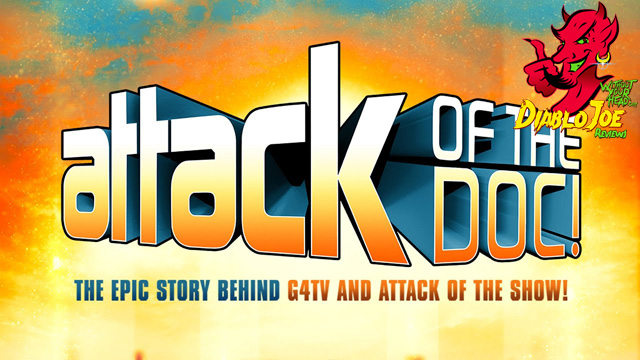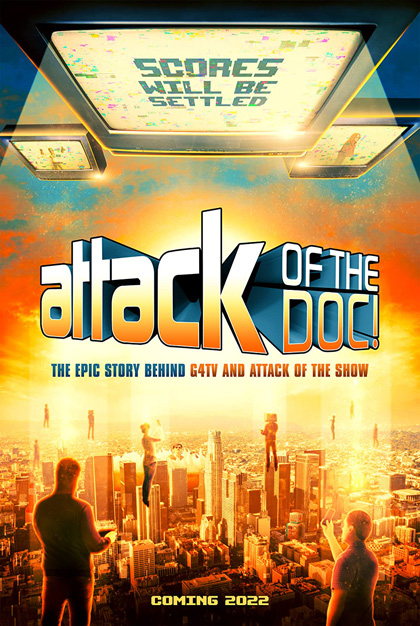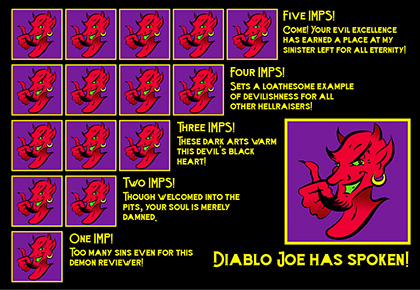

Saturday April 22, 2023 | Diablo Joe Reviews | Neal
"Attack of the Doc!"
review by Diablo Joe
"Attack of the Doc!"
Geek Culture has been around for nearly a century now. The first World Science Fiction Convention was in 1939, and since that time, fandom has exploded to become the backbone of a massive, billion-dollar multimedia industry. But things were not always thus. Not that long ago, the general public viewed geeks/nerds/fans as the outcast of society; awkward George McFlys, ever the prey of the Biff Tannens of the world. Enter, in 2002, the G4 cable network and, in 2005, "Attack of the Show," their groundbreaking live program dedicated to gaming, pop culture, movies, and almost anything geek-centric. "Attack of the Doc" is the story of G4's flagship baby, written and directed by one of the show's former on-air talents, film critic Chris Gore.
Gore's film is the story of "Attack of the Show's" rise and decline and the lasting effects it had that helped underpin the rise of geek and pop culture to perhaps the most profitable segment of the entertainment business today. It advertises itself as coming from the people who were there; the hosts, producers, and staff who helped make and shape it over its original eight-year run. "Attack of the Show" was known for its almost anything goes mentality. While nowhere near as extreme, its outrageousness definitely received some inspiration from the anarchic energy of shows like "Jackass" and "Punk'd." With the charisma and quick wit of hosts Kevin Pereira, Olivia Munn (who proved that geekdom was not devoid of female sex appeal), and others, these qualities helped show the world that fandom was as edgy and cool as anything else out there. Maybe even more so.
So why is it that, despite devotedly covering its spirited subject, "Attack of the Doc" itself comes across as rather timid and dry? The film is filled with hundreds of clips for "Attack of the Show's" thousands of episodes. Some of its most legendary moments are there for old fans to revel in again. Munn diving into a massive pool of pudding, Pereira causing mayhem in the fish markets of Tokyo alongside a kaiju squid, both hosts downing endless rounds of hot sauce shots—the film replays all of these. Still, we never get that sense of chaotic excitement that the original broadcasts must have brought with them. Part of this is the result of Gore's editing and directorial choices. "Doc" delivers everything with the same tone, without any real dynamics to goose things up. And Gore's narration of the film, while it may be personal, is equally modulated.
Likewise, the voiceovers of those who worked in front of the camera and behind the scenes lack impact. Except for a brief appearance by Pereira, intermittent humorous songs by "AOTS" personality and musician Zach Selwyn, and an onscreen appearance by the director himself, Gore has made the unusual decision not to cut to contemporary clips of anyone recounting their memories and stories of the program. Despite each voice being identified onscreen, we never gain a sense of the speakers, even if they might be familiar to us. Stripped of any accompanying facial expressions, the commentaries meld into one homogenous narration. The choice also kneecaps any diversity of visual style that might have benefitted the film. The documentary alludes to YouTubers taking over where "AOTS" left off, and, ironically, "Attack of the Doc" often plays out as if it were an extended fan-made YouTube documentary.
But most noticeably absent from the documentary is the presence of Olivia Munn, "Attack of the Show's" unquestionable breakout personality. Munn was the perfect foil and partner to Pereira, a woman who gave as good, if not better, than she got. Never afraid to get her hands—or her attitude—dirty, Munn arguably brought in and retained a lot of the show’s viewership, both male and female. While she makes up perhaps a third or more of the movie's screen time, Munn's opinion of her days on "AOTS" is relegated to an early clip taken from an interview with (interestingly) IGN. Her perspective on the show that made her a star is conspicuous by its absence.
Toward its end, "Attack of the Doc" addresses the topic of its less-than-PC antics, if perhaps a bit sheepishly. Alongside its mainstreaming of geekdom, the program brought more than a bit of “bro” culture vibe. Commentators make excuses, defenses, and perhaps some apologies. Still, many might argue that it is not surprising that the Gamergate controversy should arise immediately following the folding of the show and network that expanded the audience and appeal of gaming and fandom. Perhaps Gore is far too close to his subject to give a truly complete and unbiased recounting of “AOTS’s” significance.
It will be interesting to see how various audiences view “Attack of the Doc.” Will longtime fans feel joyously nostalgic? Or will the tepid presentation leave them underwhelmed and pining for the lost days? Will outsiders, those who once would have had little knowledge of what fandom was all about, understand how “AOTS” informed their second-hand knowledge of the culture? Or will they even get what all the fuss was about? And will younger fans and geeks, who grew up in the decade since the show ended, understand what it gifted them? Will they even care?
This devil of a reviewer gives “Attack of the Doc” 2.5 out of 5 imps

